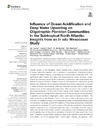Please use this identifier to cite or link to this item:
https://accedacris.ulpgc.es/jspui/handle/10553/37199
| Title: | Influence of ocean acidification and deep water upwelling on oligotrophic plankton communities in the subtropical North Atlantic: Insights from an in situ mesocosm study | Authors: | Taucher, J. Bach, L.T. Boxhammer, T. Nauendorf, A. Achterberg, E. P. Algueró-Muñiz, M. Aristegui, J. Czerny, J. Esposito, M. Guan, W. Haunost, M. Horn, H.G. Ludwig, A. Meyer, J. Spisla, C. Sswat, M. Stange, P. Riebesell, Ulf The Gran Canaria KOSMOS Consortium Gelado, María D. Fernández Urruzola, Igor Gomez, May Hernández Brito, José Joaquín Hernández Hernández, Nauzet Hernández-León, Santiago Martínez Sánchez, Ico Montoto Martínez, Tania Osma Prado, Natalia Packard, Ted T. Romero Kutzner, Vanesa Tames-Espinosa, Mayte |
UNESCO Clasification: | 2510 Oceanografía | Keywords: | Ocean acidification Plankton community composition Mesocosm experiment Marine biogeochemistry Ecological effects of high CO2, et al |
Issue Date: | 2017 | Journal: | Frontiers in Marine Science | Abstract: | Oceanic uptake of anthropogenic carbon dioxide (CO2) causes pronounced shifts in marine carbonate chemistry and a decrease in seawater pH. Increasing evidence indicates that these changes-summarized by the term ocean acidification (OA)-can significantly affect marine food webs and biogeochemical cycles. However, current scientific knowledge is largely based on laboratory experiments with single species and artificial boundary conditions, whereas studies of natural plankton communities are still relatively rare. Moreover, the few existing community-level studies were mostly conducted in rather eutrophic environments, while less attention has been paid to oligotrophic systems such as the subtropical ocean gyres. Here we report from a recent in situ mesocosm experiment off the coast of Gran Canaria in the eastern subtropical North Atlantic, where we investigated the influence of OA on the ecology and biogeochemistry of plankton communities in oligotrophic waters under close-to-natural conditions. This paper is the first in this Research Topic of Frontiers in Marine Biogeochemistry and provides (1) a detailed overview of the experimental design and important events during our mesocosm campaign, and (2) first insights into the ecological responses of plankton communities to simulated OA over the course of the 62-day experiment. One particular scientific objective of our mesocosm experiment was to investigate how OA impacts might differ between oligotrophic conditions and phases of high biological productivity, which regularly occur in response to upwelling of nutrient-rich deep water in the study region. Therefore, we specifically developed a deep water collection system that allowed us to obtain 85 m3 of seawater from 650 m depth. Thereby, we replaced 20% of each mesocosm's volume with deep water and successfully simulated a deep water upwelling event that induced a pronounced plankton bloom. Our study revealed significant effects of OA on the entire food web, leading to a restructuring of plankton communities that emerged during the oligotrophic phase, and was further amplified during the bloom that developed in response to deep water addition. Such CO2-related shifts in plankton community composition could have consequences for ecosystem productivity, biomass transfer to higher trophic levels, and biogeochemical element cycling of oligotrophic ocean regions. | URI: | https://accedacris.ulpgc.es/handle/10553/37199 | ISSN: | 2296-7745 | DOI: | 10.3389/fmars.2017.00085 | Source: | Frontiers in Marine Science [ISSN 2296-7745], v. 4, article number 85 |
| Appears in Collections: | Artículos |
SCOPUSTM
Citations
54
checked on Jun 8, 2025
WEB OF SCIENCETM
Citations
54
checked on Jan 18, 2026
Page view(s) 10
343
checked on Jan 9, 2026
Download(s)
130
checked on Jan 9, 2026
Google ScholarTM
Check
Altmetric
Share
Export metadata
Items in accedaCRIS are protected by copyright, with all rights reserved, unless otherwise indicated.
